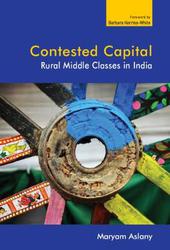
|
Contested Capital: Rural Middle Classes in India
Hardback
Main Details
| Title |
Contested Capital: Rural Middle Classes in India
|
| Authors and Contributors |
By (author) Maryam Aslany
|
| Physical Properties |
| Format:Hardback | | Pages:322 | | Dimensions(mm): Height 236,Width 165 |
|
| Category/Genre | Economic theory and philosophy
Macroeconomics
Political economy
Economic systems and structures |
|---|
| ISBN/Barcode |
9781108836333
|
| Classifications | Dewey:305.550954091734 |
|---|
| Audience | | Professional & Vocational | | General | |
|---|
| Illustrations |
Worked examples or Exercises; Worked examples or Exercises
|
|
Publishing Details |
| Publisher |
Cambridge University Press
|
| Imprint |
Cambridge University Press
|
| Publication Date |
3 December 2020 |
| Publication Country |
United Kingdom
|
Description
The expansion and transformation of Asian economies is producing class structures, roles and identities that could not easily be predicted from other times and places. The industrialisation of the countryside, in particular, generates new, rural middle classes which straddle the worlds of agriculture and industry in complex ways. Their class position is improvised on the basis of numerous influences and opportunities, and is in constant evolution. Enormous though its total population is, meanwhile, the rural middle class remains invisible to most scholars and policymakers. Contested Capital is the first major work to shed light on an emerging transnational class comprised of many hundreds of millions of people. In India, the 'middle class' has become one of the key categories of economic analysis and developmental forecasting. The discussion suffers from one major oversight: it assumes that the middle class resides uniquely in the cities. As this book demonstrates, however, more than a third of India's middle class is rural, and 17 per cent of rural households belong to the middle class. The book brings this vast and dynamic population into view, so confronting some of the most crucial neglected questions of the contemporary global economy.
Author Biography
Maryam Aslany is a Postdoctoral Researcher and a Junior Research Fellow at Wolfson College, University of Oxford, and an Associate Researcher at Paris Diderot University. Her research focuses on theories of class, emerging middle classes, rural capitalism and political economy of climate adaptation in South Asia.
Reviews'Aslany analyses the making of an Indian rural middle class, at the intersection of caste, class and status by combining quantitative and ethnographic methods. Her book is a rather unique contribution to the study of 'rurbanisation' in India. Comparing two villages of Pune district, it shows how their inhabitants depend less and less on agriculture, but commute to nearby factories. A great work on an understudied key subject!' Christophe Jaffrelot 'This is an excellent and empirically rich treatise on the self-perception people have of where they belong in India's changing class spectrum.' Jan Breman, University of Amsterdam 'This book significantly enriches our understanding of the changing dynamics of rural lives in India of the 21st century. By focussing on the subject of the 'rural middle class', the book opens up the study of the Indian village to an altogether new set of questions. Such a framing of the process of social change also enables the author to move out of the essentialist notions of the 'rural' and of 'India' that have often plagued the social science scholarship on the region. The use of 'critical pluralism' as a mode of approaching and analysing the subject has much to offer as an alternative way of looking at the middle classes and the complicated ways in which their formation intersects with other aspects of change, structural and discursive.' Surinder Jodhka, Jawaharlal Nehru University, New Delhi
|